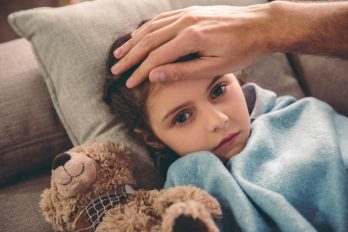The winter is the season with the most colds, coughs, and runny noses. It is simpler to spread infectious agents in crowded interior environments, dry hot air, and poor air circulation.
Common Colds
Children often experience three to ten colds per year. Children who attend child care or school for the first couple of years get one or two more colds than children of the same age who exclusively receive care at home and who do not have siblings to spread illness.
Children who have been in child care for a year or more after turning three have fewer colds than those who have not developed an immunity from being in group care.
At least 100 distinct virus types are capable of causing cold symptoms. Runny nose, scratchy or sore throat, headache, cough, sneezing, fussiness, muscle aches, or fatigue are some of the symptoms. Some kids might be experiencing a low-grade fever. A slight increase in body temperature is a sign that the body is attempting to combat an issue. The body uses a fever to fight off illness. As long as the youngster does not feel uncomfortable, these fevers do not require medical attention.
The common cold cannot be cured by medicine. Numerous studies have shown that over-the-counter cold remedies may not work and may even have negative side effects.
RSV (Respiratory Syncytial Virus)
One of the many viruses that cause respiratory illnesses—ailments of the nose, throat, and lungs—is the respiratory syncytial virus (RSV). The late fall to early spring seasons are when this virus strikes.
RSV typically results in a cold, which may progress to pneumonia or bronchiolitis (a lower respiratory tract infection). In addition to cold symptoms, bronchiolitis symptoms can include wheezing, quick breathing, nose flare-ups, head bobbing while breathing, rhythmic grunting while breathing, belly breathing, pulling between the ribs, and/or pulling around the lower neck.
The average duration of symptoms is 5-7 days. On days three through five of the illness, RSV symptoms are often at their worst. Thankfully, almost all kids who contract RSV recover on their own.
Infants who are more likely to get a severe RSV infection include:
- Infants who are premature or have low birth weight at the beginning of the RSV season are young chronologically (less than 12 weeks) (especially those born before 29 weeks gestation)
- Perinatal chronic lung disease
- Babies with certain heart abnormalities
- Those whose immune systems are compromised as a result of disease or medical interventions
Low birth weight, having siblings, maternal smoking during pregnancy, exposure to secondhand smoke in the home, a history of atopy (allergies/eczema), not breastfeeding, being around children in a child care setting, or living in crowded conditions are additional risk factors for severe RSV infections.
In the event that a youngster experiences any of the following:
- Bronchitis signs and symptoms (listed above)
- Dehydration signs and symptoms (fewer than one wet diaper every eight hours)
- Pauses or breathing issues
- Color of the tongue, lips, or skin is gray or blue.
- Markedly reduced activity and alertness
Influenza (Flu)
The flu virus is frequent and unexpected. Even in youngsters who are healthy, it can result in catastrophic consequences.
Serious flu-related consequences are more likely to affect some persons. These consist of:
- Children under the age of five, particularly those under the age of two
- Premature babies
- Children of any age who have certain long-term health issues, such as heart disease, lung disease, a neurologic or neurodevelopmental impairment like asthma,
- Expecting mothers
- Adults 65 years of age and older: Adults’ immune systems deteriorate with age.
The flu vaccine aids in lowering the number of serious illnesses and fatalities brought on by influenza each year. The national American Academy of Pediatrics recommends that any approved, suggested, and age-appropriate vaccine be given for the 2021–2022 flu season.
For the current flu season, children older than six months, parents, and other family members should all get the flu shot.
Coronavirus (COVID-19)
Please get in touch with Kid’s 1st Pediatrics for details on how to keep your child safe and well during the Coronavirus (COVID-19) pandemic.
